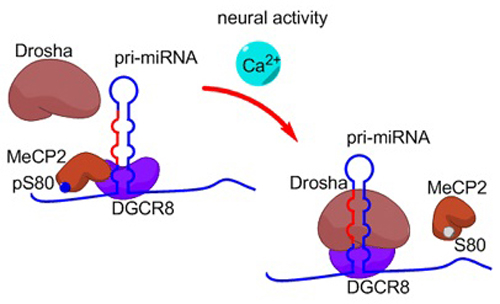Time:2014-03-11
Methyl-CpG binding protein 2 (MeCP2) was identified as a transcriptional factor mainly binding to methylated DNA sites. Its dysfunction, either loss of function or overexpression, leads to similar neurological disorders, manifested as mental retardation, autistic features and motor deficits. Previous studies mainly focused on the transcriptional regulatory functions of MeCP2 in neurons, and it is accepted widely that MeCP2 impacts the expression of microRNAs through transcriptional regulation.
In this study, Dr. QIU Zilong’s lab reported that besides transcriptional regulation, MeCP2 could suppress miRNA processing through regulating the DGCR8/Drosha complex. At first, they quantified the mature miRNA levels in the hippocampus of MeCP2 knockout mice using the RNA deep sequencing method and revealed that MeCP2 mainly suppressed miRNA expression. However, primary miRNA transcripts changed little under MeCP2 depletion conditions. To further explore the mechanism for miRNA expression regulation by MeCP2, they investigated the interaction between MeCP2 and the DGCR8/Drosha complex, the major miRNA processing machine in nucleus.
Results showed that MeCP2 could interact with DGCR8 directly and such interaction suppresses the formation of the DGCR8/Drosha complex. Furthermore, phosphorylation of MeCP2 at the Serine 80 site is essential for its interaction with DGCR8. Neuronal stimulation dephosphorylates Serine 80 site and changes the conformation of MeCP2 structure, leading to the disassociation of MeCP2 and DGCR8 and release of the miRNA processing process. In addition, this study revealed that MeCP2 overexpression further suppressed the miRNA processing, resulting in the inhibition of dendritic growth and spine formation in brain slices.
This work was mainly carried out by graduate student CHENG Tianlin and colleagues under the supervision of Dr. QIU Zilong, in collaboration with Dr. WANG Zhizhi in Dr. XU Wenqing’s laboratory (University of Washington). This work entitled " MeCP2 suppresses nuclear microRNA processing and dendritic growth by regulating the DGCR8/Drosha complex " was published in the Journal of Developmental Cell on March 10, 2014. It was supported by the 973 Program, the Strategic priority Research Program of the Chinese Academy of Sciences .

Latest study from Dr. QIU Zilong’s lab unraveled a novel mechanism of miRNA processing regulation by MeCP2: in neurons, MeCP2 directly interacts with DGCR8 to suppress the formation of DGCR8/Drosha complex, resulting in the impairment of miRNA processing. Neuronal stimulation leads to calcium influx and dephosphorylation of MeCP2 at the Serine 80 site. This dephosphorylation changes the MeCP2 structure and releases the inhibitory effect of MeCP2 on DGCR8/Drosha complex formation.
 附件下载:
附件下载: